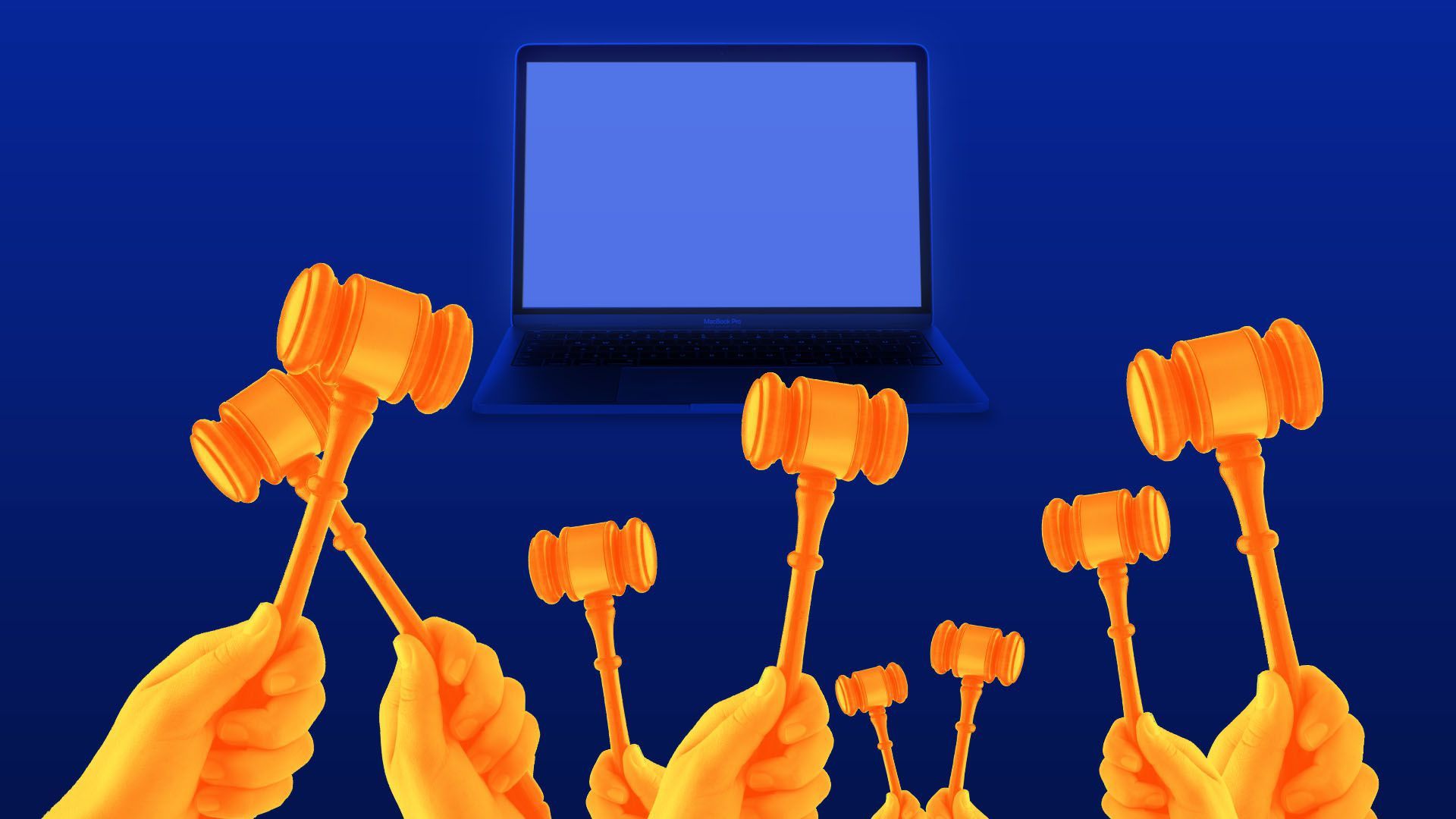Justices hear Oracle and Google code arguments
Add Axios as your preferred source to
see more of our stories on Google.

Illustration: Sarah Grillo/Axios
Lawyers for Oracle and Google debated whether programming interfaces are copyrightable as the companies' decade-long legal fight arrived at U.S. Supreme Court oral arguments Wednesday.
Why it matters: Both sides agreed that the case could determine the future health of software innovation, and both offered dire predictions — what justices repeatedly called "sky is falling" arguments — should the other side prevail. There's also money involved: Oracle is asking for nearly $9 billion in damages from Google for its use of Java code in the Android operating system.
Catch up quick: When Google built Android, it incorporated the programming interface (API) for Java, then owned by Sun Microsystems. Oracle purchased Sun in 2010, then sued Google.
- Oracle and Google have swapped victories in lower courts; most recently, the federal appeals court ruled in Oracle's favor in 2018, prompting Google to seek Supreme Court review.
The bottom line: If Oracle wins, according to Google, software innovation will halt and the software industry's long tradition of creating interoperable products will end. If Google wins, according to Oracle, the software industry will see its business model "detonated" and code theft will become the norm.
Between the lines: APIs are "declarative" code that describes how one piece of software can talk to another, rather than functional code that actually performs a task.
- APIs are routinely incorporated by both partners and competitors across the tech industry. They're also often licensed.
- At issue in this case is whether they are a form of creative expression that can be protected by copyright rules, as Oracle maintains, or a kind of "method of operation" that never varies in form and therefore can't be copyrighted, as Google holds.
- A sweeping court decision either way could overturn the industry's long-standing unwritten rules and transform massive codebases into legal battlegrounds.
Where it stands: Questioning was tough on Google throughout, with justices asking Google's outside counsel Thomas Goldstein why Google's use of the Java code was any different than cracking a safe to get money or stealing a rival football team's playbook.
At other points, justices appeared to be sympathetic to the arguments from software developers that a ruling in favor of Oracle would upend their work, and to Google's case that APIs are more like "plugs and sockets" than novels or movies.
The intrigue: Both Justices Stephen Breyer and Sonia Sotomayor were agreeable toward Google. Chief Justice John Roberts and Justice Clarence Thomas seemed more sympathetic to Oracle, while Roberts did note amici briefs from computer scientists and Microsoft warning of bad consequences for the industry.
- Justice Neil Gorsuch's questioning suggested the possibility of sending the case back to a lower court without a ruling.
Google's argument:
- Goldstein argued the Java API was not a creative work and that Oracle, by claiming exclusive control of the code, was asserting a patent right.
- "It has always been the understanding that this purely functional, noncreative code, essentially the glue that keeps computer programs together, could be reused, and it would upend that world to rule the other way," said Goldstein.
Oracle's argument:
- "If this court holds that a jury may conclude that copying declaring code is fair, it will encourage copying, create legal uncertainty, and decimate the business model which a lot of companies depend on, undermining the very incentives copyright was designed to promote," said Joshua Rosenkranz, outside counsel for Oracle.
- Rosenkranz said Apple and Microsoft spent billions to create competing mobile phone operating systems and Google could have done the same.
- "We have heard dire predictions from Google about software innovation," said Rosenkranz. "The software industry rose to world domination because of copyright protection, not unlicensed copying."
Of note: The oldest justice, Breyer, introduced the hearing's most repeated analogy when he compared API design to the layout of the QWERTY typewriter keyboard — a standard layout of convenience whose creator isn't owed payments.
What we're hearing:
- “We spoke for software developers, computer scientists, businesses and consumers who support software innovation. Developers want to create applications that work across platforms, without fearing that companies will misuse copyright law to block interoperability," Kent Walker, Google's senior vice president of global affairs, said.
- “Strong intellectual property protection is the cornerstone of American innovation. We are confident the Supreme Court will agree with us that all software is covered by copyright and that Google’s copying for its own commercial advantage and expediency can’t possibly be fair use,” said Dorian Daley, Oracle general counsel.
What's next: A ruling is expected next spring or summer.
Go deeper:
- In Google/Oracle case, Supreme Court will weigh software's future
- Trump administration backs Oracle in Google fight
- At the Supreme Court, a league of software defenders for Google
- Google launches opening salvo against Oracle at Supreme Court
- Oracle counters Google's innovation claims in Supreme Court fight
